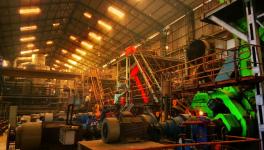The Continuing Relevance of Karl Marx

Image Courtesy: DW
A hundred and thirty-five years after his death on March 14, 1883, and 200 years after his birth on May 5, 1818, Karl Marx continues to exert enormous intellectual and practical influence across the world. The socialist future, he so confidently predicted, has not yet become the global reality that many had hoped it would. The capitalist mode of production that he diagnosed as crisis-prone and doomed to extinction in the course of further historical development dominates the contemporary world. The early attempts at establishing a socialist society have faced exceptionally difficult problems in a predominantly capitalist/imperialist world. Yet, none of these facts can be seen rendering Marx irrelevant or as diminishing the power and vitality of his theory and vision. Why?
First, Marx broke new ground in human thought by making a very fundamental contribution. By demonstrating that human historical development can be understood in a scientific manner by looking at the way human societies produced and reproduced themselves, he elevated history into a Science, rather than a mere descriptive narration of palace intrigues, wars, dynastic rulers and their numerous exploits. He placed human beings and their conscious, purposive activity –human labour –at the centre of his analysis of human history. He was able to show that the uniqueness of the human species lay in their conscious productive activity whereby they transformed Nature to produce their means of existence. In the process, human beings also changed and evolved, acquiring new knowledge and new skills all the time, and learning more and more about how nature works and harnessing this knowledge to improve the productive powers of society. Thus the ceaseless development of productive forces was the constant feature of human historical development.
The second important point Marx made in relation to human historical development was that human beings, not only interacted with nature to produce what they needed, they also had to necessarily interact with one another in the act of carrying out production. The notion of human beings as primarily ‘individuals’ is a creation of modern bourgeois society while the fact of history is that human beings have always existed as social beings and that production at all stages of historical development takes place in and through society.
Third, Marx demonstrated that as productive powers of a human society – its ‘productive forces’ - inevitably keep growing, they necessarily come into conflict with the prevalent way of organizing social production and reproduction, which he called ‘the social relations of production’. Fourth, he made the point that as productive forces developed, there would emerge a surplus of production over and above the needs of social reproduction, which would then enable a section of society to live off the labour of the rest of society. In other words, the emergence of a surplus would make logically possible the coming into being of class society, based on a division of society between the majority who work – the exploited - and a minority who live off the labour of the majority – the exploiters. Such a class division would, of course, be possible only on the basis of the minority of exploiters being in control of social production, primarily through their monopoly of ownership of the means of production. To enforce this unequal social arrangement and to compel the exploited majority to work for the exploiting minority, both force and ‘persuasion’ would be needed. The State would be the agent of force that guarantees private ownership and control of production by the owning minority. Since the use of force via state power would alone not suffice in the long run to maintain the unequal social order, ideology and other tools of legitimation - religion, culture, literature and so on – would also come into play.
If Marx had stopped with demonstrating the historical inevitability of class society along with the growth of productive forces, his work could have been even used to legitimise class exploitation and class rule. But Marx did not stop with this. His outstanding contribution lay precisely in demonstrating that class societies in human history are neither natural nor eternal, and that each class society contained the seeds of its dissolution and overcoming by a new, higher level of human development, and that the dynamic through which this process takes place is that of class struggle. Marx’s unique contribution was to identify the key class - the key historical agent – that would overthrow a prevailing class society to lead the new society that replaces it. With this, Marx was able to identify the role of the bourgeoisie in the transition to capitalism, immortalising this theoretical leap in the unforgettable lines of the Communist Manifesto. Even more important, he was categorical in arguing that the rise of capitalism from the seventeenth century onwards and its rapid conquest of the world by the middle of the nineteenth century did not signify its permanence. He argued that, in the course of capitalist development, the working class would emerge as the organized force with the potential to take humanity forward to a higher stage of social existence first, to a socialist society second, and ultimately, to a society of material abundance and harmonious social relations, the communist society.
The continuing relevance of Marx has been dramatically demonstrated by the current crisis of contemporary capitalism. Marx had made several important observations about the laws of motion of capitalism. He had made the point that as the capitalist competition progresses, centralization and concentration of capital would inevitably occur. This would lead to an ever-increasing monopolisation. Competition among capitalists and the class struggle between labour and capital would lead to increasing mechanization, which would constantly create and replenish a reserve army of labour, an expanding pool of workers who would go in and out of employment. An increasing proportion of them would become permanently unemployed. These processes of capitalist accumulation would concentrate wealth and income in fewer and fewer hands, while inequalities will increase enormously. Marx made the brilliant observation that the general law of capitalist accumulation was the accumulation of wealth at one pole and misery at the other. A key consequence of this would be that there would always be a problem of demand under capitalism. Even as the capitalist mode of production causes the rapid growth of productive forces, the profit-driven system limits the growth of the consuming power of society, causing capitalism to function as a demand-constrained system. Moreover, given its unplanned character, there would always be ‘overproduction’ in some sectors relative to demand and ‘inadequate production’ in others. These imbalances can also be the cause of a general crisis in a capitalist economy. Further, as capitalists mechanize to meet competition and to overcome the power of workers, production would involve the use of more and more machinery and less and less of living labour, which is, in fact, the source of surplus value and of capitalist profit. This, too, would give rise to a tendency for the rate of profit to fall, from time to time. Taking all this together, it is clear that, under capitalism, though there can be episodes of rapid growth, there would also be economic breakdowns from time to time, resulting in massive unemployment and collapse of markets. The history of capitalism since Marx wrote his magnum opus, Das Kapital, has borne out Marx’s analysis of the crisis-prone nature of the capitalist economy. Nothing illustrates this better than the contemporary situation, so dramatically different from what was observed twenty years ago.
Around 1989-91, ten years before the new millennium arrived, it appeared to many that the battle for a society free of exploitation and not based on the drive for private profit had been lost, with the decisive rise to unipolar global dominance of the USA, the dismemberment of the mighty Soviet Union and the restoration of capitalism in former USSR and the countries of Eastern Europe that had been engaged in building socialism. Confident spokespersons for global capitalism even announced ‘the end of history’. Unfortunately for those who thought that capitalism had decisively won the battle for the hearts and minds of the people all over the world and that history had effectively been “ended”, the world today presents a rather different picture. Since the last quarter of 2007 when the US economy officially entered into a recession – recall, by the way, that this was several months before the collapse of Lehmann Brothers and the official recognition of what is somewhat misleadingly referred to as the ‘global financial crisis’ – there has been no end to the prolonged economic slump and a long period of slow growth in the developed capitalist world.
The recurrent crises of capitalism alone would testify to the continuing relevance of Marx’s analysis of capitalism and the viewpoint of historical materialism. But there is much else that Marx had anticipated, including many of the contemporary concerns about the environment. In a brilliant passage in the first volume of Capital, Marx makes the point that capitalism advances agriculture precisely by sapping the basic sources of wealth, namely the soil and the labourer. His analysis of many aspects of culture, of the alienation that characterises capitalist society, of the issues of gender equality, of colonial plunder and its role in the development of capitalism in the western world –all these remain relevant today, as we face the onslaught of contemporary imperialist globalization that seeks to once again enslave the developing countries and is causing grave and irreparable damage to the environment and the earth we live in. The climate crisis cries out for collective solutions, but the logic of corporate profit maximization, without let or hindrance that defines contemporary globalization, makes it impossible under capitalism. The scandal of mass hunger and malnutrition in a world where science has advanced to the point of promise of ‘immortality’ is a reminder that capitalism as an economic system has been historically obsolete for quite some decades now.
History and historical epochs cannot be and should not be measured in years, decades and even centuries. After all, it took several centuries for the capitalist mode of production to expand across the globe and reach its current position of domination, despite the fact that capitalism, driven by the relentless pursuit of profit, is a mode of production that is inherently expansionist unlike the ones before it in history. The fact that the first few human attempts at building a self-consciously organized society, free of class exploitation, have not been able to sustain themselves in line with original visions, is not such a great defeat. This is especially the case when one recalls that these attempts occurred in backward socioeconomic territories that were surrounded by a hostile imperialist world which sought to strangle them by all means, including waging of war, the imposition of an arms race, and denial of access to technology, markets and all other means of development. We are yet to see a fully socialist society in any part of the world, much less a communist society. What we have had and continue to have are courageous attempts at building socialism in a hostile world, learning from past historical experience, using the analytical perspective provided by Marx, Lenin and those who have enriched the perspective with theoretical and practical lessons from concrete historical experience. The struggle ahead is a long and arduous one, with no shortcuts. But the prize at the end of it is human liberation, well worth all the efforts that successive human generations can put into it. And putting in that effort will be the greatest tribute we can pay Marx. He deserves no less.
Get the latest reports & analysis with people's perspective on Protests, movements & deep analytical videos, discussions of the current affairs in your Telegram app. Subscribe to NewsClick's Telegram channel & get Real-Time updates on stories, as they get published on our website.
























